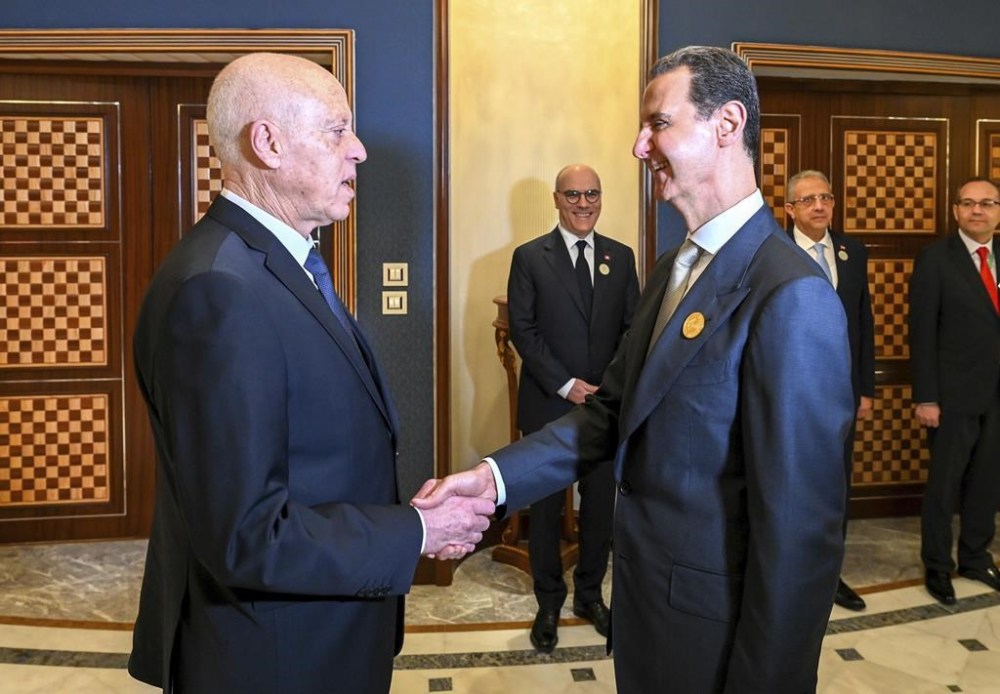Tunisian leader calls meeting with Syria’s Assad ‘historic,’ buries memories of Arab Spring
Advertisement
Read this article for free:
or
Already have an account? Log in here »
To continue reading, please subscribe:
Monthly Digital Subscription
$0 for the first 4 weeks*
- Enjoy unlimited reading on winnipegfreepress.com
- Read the E-Edition, our digital replica newspaper
- Access News Break, our award-winning app
- Play interactive puzzles
*No charge for 4 weeks then price increases to the regular rate of $19.00 plus GST every four weeks. Offer available to new and qualified returning subscribers only. Cancel any time.
Monthly Digital Subscription
$4.75/week*
- Enjoy unlimited reading on winnipegfreepress.com
- Read the E-Edition, our digital replica newspaper
- Access News Break, our award-winning app
- Play interactive puzzles
*Billed as $19 plus GST every four weeks. Cancel any time.
To continue reading, please subscribe:
Add Free Press access to your Brandon Sun subscription for only an additional
$1 for the first 4 weeks*
*Your next subscription payment will increase by $1.00 and you will be charged $16.99 plus GST for four weeks. After four weeks, your payment will increase to $23.99 plus GST every four weeks.
Read unlimited articles for free today:
or
Already have an account? Log in here »
Hey there, time traveller!
This article was published 19/05/2023 (906 days ago), so information in it may no longer be current.
JEDDAH, Saudi Arabia (AP) — Smiles, a handshake and what Tunisian President Kais Saied called a “historic meeting” with the long-ostracized Syrian leader Bashar Assad.
The talks between the two presidents, held before the start on Friday of the Arab League summit in Saudi Arabia, buried memories, and perhaps the legacy, of the Arab Spring which started in Tunisia 12 years ago. That series of uprisings gave the North African country its first taste of democracy as protests rolled across the region, including in Syria.
“Today, I am absolutely convinced of Tunisian support for Syria,” a statement from Saied’s office said after what it called the “historic” meeting.

Tunisia, reborn after its 2011 revolution which toppled autocratic ruler Zine El Abidine Ben Ali, was among the fiercest critics of Assad. But Saied has largely trampled the gains of Tunisia’s revolution since his 2019 election, notably by assuming near full powers after suspending the legislature in 2021 then dissolving it in his crackdown on corruption and dissent.
Tunisia resumed diplomatic relations with Syria in April, and Assad’s presence at the Arab League summit sealed Syria’s return to the club of Arab nations.
The official TAP news agency showed photos of him and Assad greeting each other with smiles, a warm hand shake and a sit-down for serious talks. Assad was invited to the residence where the Tunisian president was staying in Jeddah, the Saudi Arabian city hosting the summit.
Syria was kicked out of the club of Arab nations in 2011 at the start of its brutal civil war. That was months after Tunisia’s revolution.
“We stand together against the movement of darkness,” Assad said, apparently referring to extremist groups that came to dominate the Syrian opposition as his country’s war ground on, and militants groups there drew a large number of recruits from Tunisia.
In an interview with Tunisian television, Assad said that the North African country “used to be a platform to propagate the (Islamist) mindset.”
“After my meeting with Kais Saied, I am now convinced that the Arab people hasn’t changed and Tunisia is the same,” he was quoted as saying by the Radio Mosaique.
Among numerous figures jailed in Saied’s crackdown is Rached Ghannouchi, head of the moderate Islamist party that triumphed in Tunisia’s first free elections in October 2011. Ghannouchi was also speaker of the parliament that Saied dissolved.

